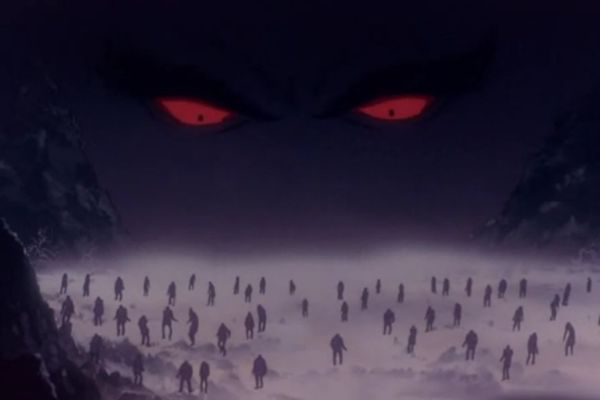
Watching you: A dark and jealous god arises.
Atheists will often say to monotheists: “I just believe in one less god than you do.” In practice, the difference is arguably even less. I would argue that the vast majority of atheists today believe in “half a god”.
There is an invisible, benevolent but still dangerous being that has the power and the wisdom to decide over life and death. Due to its nature, this being is not visible to the human eye, but its commands are carried out by a large staff of human servants. This being is also considered competent to regulate our lives (and, perhaps more important to most of us, the lives of our neighbors) in great detail, down to who we are allowed to have sex with. But it also looks after us, and gives us each day our bread even if we don’t deserve it, and far more than bread if we serve it faithfully. Generations are born, live and die, serving this great being, giving their lives if needed. I am, of course, talking about the state or nation.
The gradual growth of the state has given it steadily more of the powers that were in the past considered suitable only for God, and this process has particularly gained speed over the last few generations. During the same time, and in the same countries, open atheism has begun to blossom. In the social democratic nations of northern Europe, atheism is now the norm. But how much of a leap is that really, if the state conveniently provides pretty much the same framework for individuals and societies, which religion provided in the past?
Now you may argue that the state is thoroughly this-worldly and does not promise salvation or a blessed afterlife to the soul. That is hopefully the case, but I will point out that neither did Yahweh back in the days of the Pentateuch. Even as late as Solomon (or whoever wrote in his name), God’s own truth was that “the dead know nothing” and have no more part in what transpires under the sun. Toward the end of the Old Testament, there are more or less clear promises of a future resurrection. But the concept of a non-corporeal afterlife in an invisible paradise is at best hinted at in the New Testament, where the resurrection is still the main event. So today the state is roughly at the level of Moses’ God in that it can kill and that’s the end of it. If the technology advances enough, it may start offering selective resurrections, and perhaps eventually promise to upload us to the Cloud. This could certainly happen in your lifetime if you are young, although it may not happen at all, depending on how history unfolds.
My point is that it is a lot easier to be an atheist these days, as long as you are allowed to trust in a state that does its best to make itself as godlike as possible. It is rather less impressive than it would otherwise have been. And monotheists may not need to actually use their faith a lot either, since they can just float along on the same current as the atheists – for now. There are times and places where you cannot serve God and State, and where the State basically says, “Thou shalt have no other god before me.” I am not fond of this practice. I’d rather we give Caesar what is Caesar’s, and not much more.
But at least, don’t crow about being an atheist if you depend on an invisible higher power to give your life direction.
